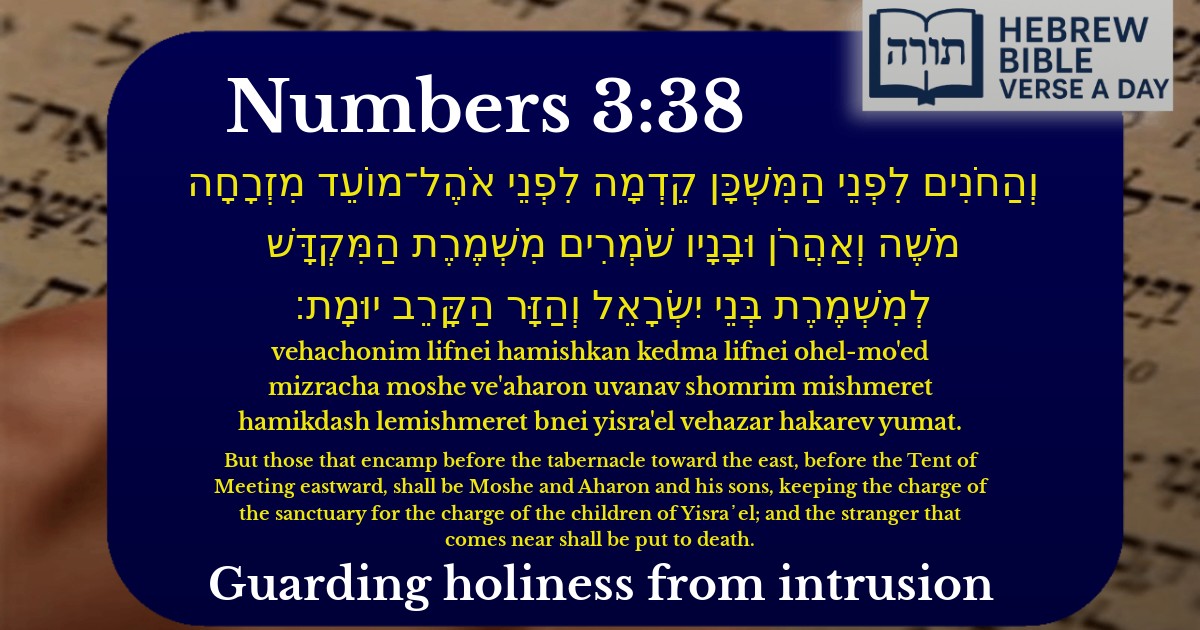Frequently Asked Questions
Q: What does Numbers 3:38 mean?
A: Numbers 3:38 describes the specific camping arrangement of Moshe (Moses), Aharon (Aaron), and his sons to the east of the Mishkan (Tabernacle). They were responsible for guarding the sanctuary and ensuring that unauthorized individuals (referred to as 'the stranger') did not approach, as doing so carried severe consequences (death). This highlights the sanctity of the Mishkan and the special role of the Kohanim (priests) in its service.
Q: Why was the east side of the Mishkan so important?
A: The east side of the Mishkan was significant because it faced the entrance to the Ohel Moed (Tent of Meeting). Rashi explains that Moshe, Aharon, and his sons camped there to oversee and protect the Mishkan, ensuring only those permitted could enter. The eastward position also symbolized vigilance, as the rising sun first illuminates this direction, representing constant readiness in serving Hashem.
Q: What does 'the stranger that comes near shall be put to death' mean?
A: This phrase emphasizes the extreme holiness of the Mishkan. According to Rambam (Hilchot Bi'at HaMikdash 1:15), only Kohanim (priests) with the proper sanctity could perform certain duties in the Mishkan. A 'stranger' (zar)—any non-Kohen or unauthorized person—who attempted to approach for service would be liable for death, as taught in the Talmud (Sanhedrin 83a). This law safeguarded the purity of Divine worship.
Q: How does this verse apply to us today?
A: While we no longer have the Mishkan, the principle of respecting sacred boundaries remains. The Talmud (Berachot 55a) derives from this that we must treat holy spaces (like synagogues and study halls) with reverence. Additionally, the role of the Kohanim reminds us of the importance of designated spiritual leadership in Jewish life, such as rabbis and teachers guiding the community in Torah observance.
Q: Why were Moshe and Aharon's sons given this responsibility?
A: Aharon's sons (the Kohanim) were chosen for this duty because of their unique role in serving Hashem in the Mishkan. The Midrash (Bamidbar Rabbah 3:8) explains that their proximity to the Mishkan reflected their elevated spiritual status. Moshe, though not a Kohen, camped with them due to his unparalleled closeness to Hashem and his leadership in transmitting the Torah to Bnei Yisrael (the Children of Israel).


Location and Significance of the Eastern Encampment
The verse describes the unique position of Moshe, Aharon, and his sons, who encamped east of the Mishkan (Tabernacle). Rashi (Bamidbar 3:38) explains that this placement was strategic, as the east was the direction from which one would first approach the Mishkan. This positioning symbolized their role as the primary guardians of the sanctity of the Mishkan, ensuring that no unauthorized individuals entered.
The Role of Moshe, Aharon, and the Kohanim
Rambam (Hilchot Bi'at HaMikdash 8:10) elaborates that the Kohanim and Levi'im were entrusted with safeguarding the Mishkan. Moshe, as the leader, and Aharon, as the Kohen Gadol (High Priest), along with his sons, were given the highest level of responsibility. Their encampment at the entrance signified their role as intermediaries between the people and the Divine Presence.
Prohibition Against Unauthorized Entry
The phrase "וְהַזָּר הַקָּרֵב יוּמָת" ("the stranger that comes near shall be put to death") underscores the severity of trespassing into sacred spaces. The Talmud (Sanhedrin 81b) discusses the capital punishment for a zar (non-Kohen) who enters areas restricted to Kohanim. The Midrash (Bamidbar Rabbah 1:12) adds that this law was meant to instill reverence for the Mishkan and prevent its desecration.
Spiritual and Practical Implications